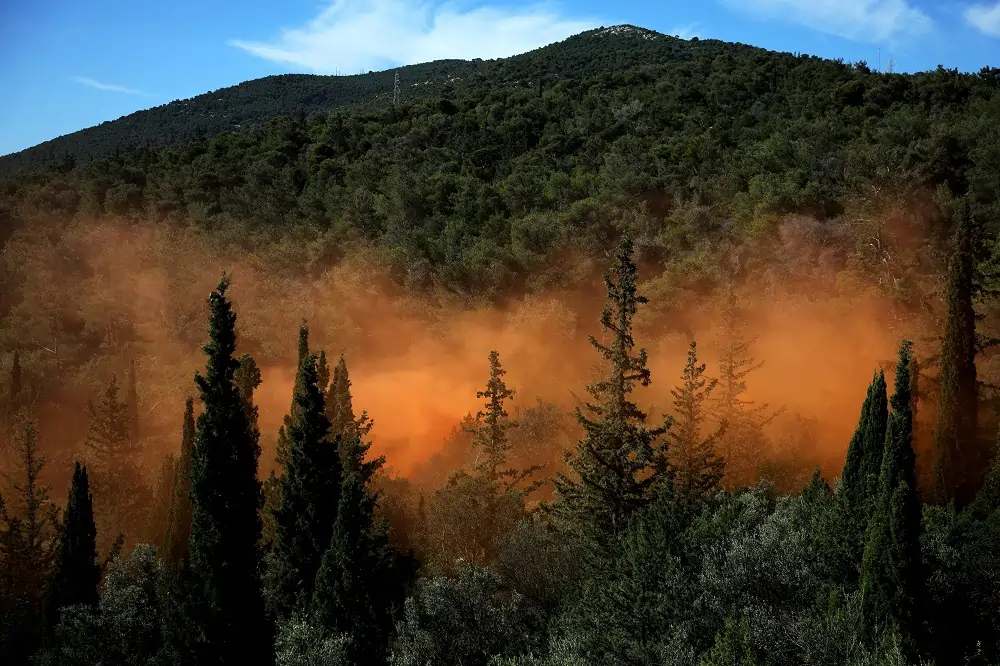
Greek summer wildfire threat nears, outpacing plans to contain it
By Angeliki Koutantou
ATHENS (Reuters) – When firefighters arrived at a blaze in a pine forest on the Greek island of Rhodes last July, flames were already leaping above the trees into the night sky. The volunteers needed to act fast, but dense vegetation on the forest floor blocked access.
With crews unable to get close, the fire spread and within days had engulfed the Mediterranean island, forcing 19,000 people to flee – one of the biggest disaster evacuations in Greece’s history.
“Have you ever tried walking through a forest that has not been cleared for more than 10 years? It’s so difficult,” said firefighter Nikos Karpathakis, who was at the scene.
As another summer approaches, and as climate change makes wildfires ever more deadly across southern Europe, Greece has developed a new doctrine to contain the damage, including deploying an extra fire truck to each new blaze, speeding up air support and clearing forests.
But five firefighters and three experts said the initiative doesn’t address shortfalls in planning and prevention and more devastation awaits.
“We are clinging to a doctrine which insists on fire suppression instead of adopting an integrated fire management strategy,” said Theodore Giannaros, a fire meteorologist at the National Observatory of Athens.
Heat waves triggered wildfires across swathes of Portugal, France, Spain and Italy last year and caused dozens of deaths.
The situation is especially dire in Greece, which has just recorded its warmest winter on record, creating ideal conditions for fires that threaten crops, homes and the booming tourism industry.
Last August, a fire in the northern Evros region destroyed an area larger than New York City and killed at least 20 people – the deadliest European blaze of 2023. Fires this year have begun earlier than expected, including one in March in a mountainous area normally blanketed by snow.
“It will be a very tough wildfire season. Climate change is here,” Vassilis Kikilias, Minister for Climate Crisis and Civil Protection, told Reuters.
MORE NEEDED
Greece has made strides to combat fires, including building firebreaks around power poles in forested areas and stepping up training.
Some 700 additional forest rangers were hired this year. Crews have cleared 12,000 hectares of forest since 2022 and another 7,000 hectares will be completed by the end of May, the environment ministry said.
“For the first time in 50 years, we’re stepping into forests and building firebreak zones,” Kikilias said. “Certainly it won’t be done at once throughout Greece but it’s a good start.”
Under a 2.1 billion euro ($2.25 billion) plan, Greece has concluded tenders for more than 1,000 fire engines and seven DHC-515 aircraft, and plans to install sensors to detect smoke.
Experts worry it won’t be enough.
The cleared forests make up only a tiny fraction of the nearly 7.5 million hectares of Greek woodland. Some of the tendered trucks and aircraft will not be delivered for years.
They said more money should be spent creating a corps of wildfire specialists who can draft risk maps and analyse how fires are likely to spread. They recommended embracing firefighting methods used in other parts of the world, such as “backfiring”, where firefighters light new fires in the path of existing ones to starve them of fuel.
Volunteer firefighter Karpathakis is haunted by last summer. He said crews laid down 2 km of hoses to get closer to the Rhodes fire. It was too late. Gale force winds blew the blaze beyond their reach.
“I worked non-stop for so many days but the situation didn’t get any better.”
(Reporting by Angeliki Koutantou; Editing by Edward McAllister and Nick Macfie)


